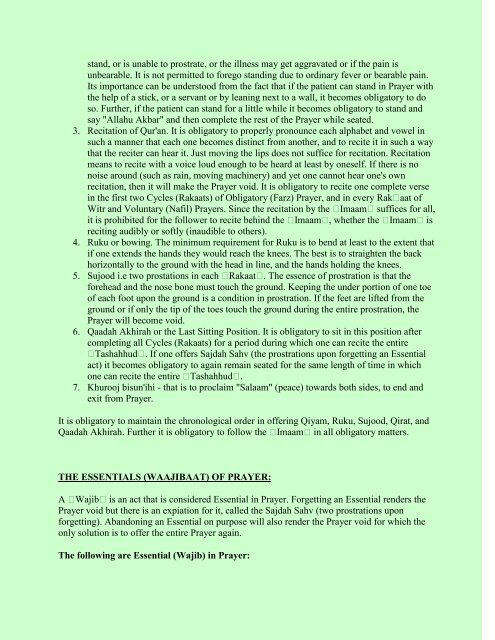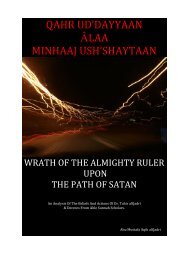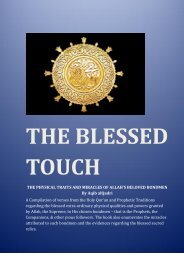The Book Of Prayer (Kitaab-ul-Salaat)
The Book Of Prayer (Kitaab-ul-Salaat)
The Book Of Prayer (Kitaab-ul-Salaat)
You also want an ePaper? Increase the reach of your titles
YUMPU automatically turns print PDFs into web optimized ePapers that Google loves.
stand, or is unable to prostrate, or the illness may get aggravated or if the pain is<br />
unbearable. It is not permitted to forego standing due to ordinary fever or bearable pain.<br />
Its importance can be understood from the fact that if the patient can stand in <strong>Prayer</strong> with<br />
the help of a stick, or a servant or by leaning next to a wall, it becomes obligatory to do<br />
so. Further, if the patient can stand for a little while it becomes obligatory to stand and<br />
say "Allahu Akbar" and then complete the rest of the <strong>Prayer</strong> while seated.<br />
3. Recitation of Qur'an. It is obligatory to properly pronounce each alphabet and vowel in<br />
such a manner that each one becomes distinct from another, and to recite it in such a way<br />
that the reciter can hear it. Just moving the lips does not suffice for recitation. Recitation<br />
means to recite with a voice loud enough to be heard at least by oneself. If there is no<br />
noise around (such as rain, moving machinery) and yet one cannot hear one's own<br />
recitation, then it will make the <strong>Prayer</strong> void. It is obligatory to recite one complete verse<br />
in the first two Cycles (Rakaats) of Obligatory (Farz) <strong>Prayer</strong>, and in every Rak’ aat of<br />
Witr and Voluntary (Nafil) <strong>Prayer</strong>s. Since the recitation by the “ Imaam” suffices for all,<br />
it is prohibited for the follower to recite behind the “ Imaam” , whether the “ Imaam” is<br />
reciting audibly or softly (inaudible to others).<br />
4. Ruku or bowing. <strong>The</strong> minimum requirement for Ruku is to bend at least to the extent that<br />
if one extends the hands they wo<strong>ul</strong>d reach the knees. <strong>The</strong> best is to straighten the back<br />
horizontally to the ground with the head in line, and the hands holding the knees.<br />
5. Sujood i.e two prostations in each “ Rakaat” . <strong>The</strong> essence of prostration is that the<br />
forehead and the nose bone must touch the ground. Keeping the under portion of one toe<br />
of each foot upon the ground is a condition in prostration. If the feet are lifted from the<br />
ground or if only the tip of the toes touch the ground during the entire prostration, the<br />
<strong>Prayer</strong> will become void.<br />
6. Qaadah Akhirah or the Last Sitting Position. It is obligatory to sit in this position after<br />
completing all Cycles (Rakaats) for a period during which one can recite the entire<br />
“ Tashahhud” . If one offers Sajdah Sahv (the prostrations upon forgetting an Essential<br />
act) it becomes obligatory to again remain seated for the same length of time in which<br />
one can recite the entire “ Tashahhud” .<br />
7. Khurooj bisun'ihi - that is to proclaim "Salaam" (peace) towards both sides, to end and<br />
exit from <strong>Prayer</strong>.<br />
It is obligatory to maintain the chronological order in offering Qiyam, Ruku, Sujood, Qirat, and<br />
Qaadah Akhirah. Further it is obligatory to follow the “ Imaam” in all obligatory matters.<br />
THE ESSENTIALS (WAAJIBAAT) OF PRAYER:<br />
A “ Wajib” is an act that is considered Essential in <strong>Prayer</strong>. Forgetting an Essential renders the<br />
<strong>Prayer</strong> void but there is an expiation for it, called the Sajdah Sahv (two prostrations upon<br />
forgetting). Abandoning an Essential on purpose will also render the <strong>Prayer</strong> void for which the<br />
only solution is to offer the entire <strong>Prayer</strong> again.<br />
<strong>The</strong> following are Essential (Wajib) in <strong>Prayer</strong>:





